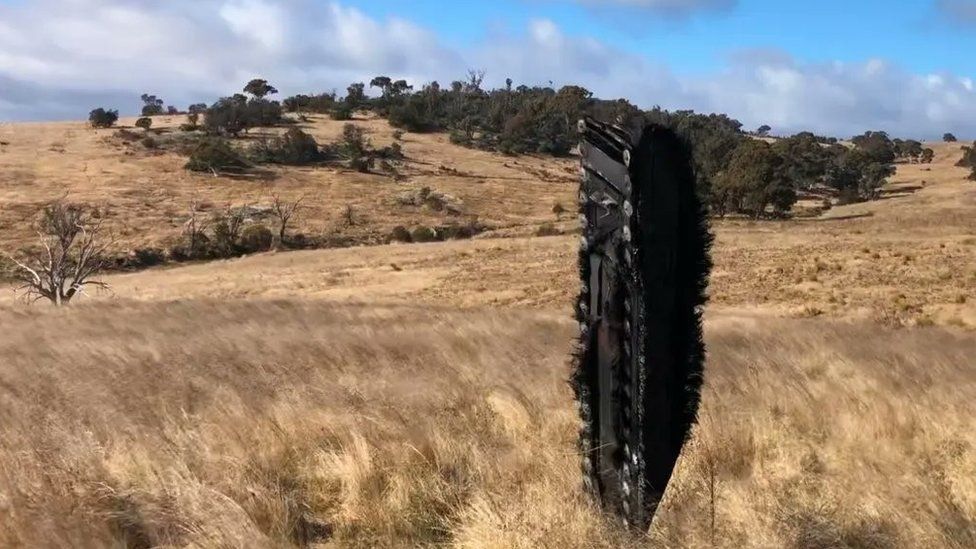Space debris Australia: Piece of SpaceX capsule crashes to Earth in field

Collected Image
When Mick Miners, a farmer in New South Wales, Australia, first saw a large black object sticking out of the ground in a remote part of his land, he thought it was a dead tree. But on closer inspection - and verification from experts - he learned it had fallen from space.
The Australian Space Agency (ASA) later said it came from a SpaceX capsule. Experts described the discovery as "rare" and "exciting" - but said such events may become more common. The object landed on 9 July in a large area of fields, but was not discovered by Mr Miners until several weeks later. Two other pieces were later found nearby, and the ASA asked anyone who came across further items to contact a debris hotline set up by SpaceX. Dr Brad Tucker, an astrophysicist at the Australian National University, was called to examine the object.
He is often called to similar discoveries - the vast majority of which turn out not to be space debris. "This has been super exciting to see this all up close, I've never seen a piece of space junk fall like this," he said in a video shared online.
Don Pollacco, a professor of astrophysics at the UK's Warwick University, agreed that it was very rare for space debris to hit land. While objects fall from space to Earth every day, the vast majority land in the oceans covering most of the planet, he said.
What's more, the only recorded case of a person being hit was Lottie Williams, who was unhurt when a piece of space debris landed on her shoulder in Oklahoma, US, in 1997. Other incidents include damage to buildings in Ivory Coast in 2020, from pieces of a Chinese rocket.
However, discoveries on land may become more common - especially as the number of rockets sent to space has hugely increased in recent years. The Sun is also moving into a cycle of being more active, Prof Pollacco added, a knock-on effect of which may be more debris falling to Earth. Perhaps more worrying is a study from Canada's University of British Columbia, published in July, which found there was a 10% chance of one or more people being killed by space debris in the next decade.
But Prof Pollacco still says the chance of an individual being hurt is "almost zero", adding: "I don't think people need to be frightened, the likelihood of them getting hit is unbelievably small." SpaceX did not immediately respond to the BBC's request for comment.
The Australian Space Agency (ASA) later said it came from a SpaceX capsule. Experts described the discovery as "rare" and "exciting" - but said such events may become more common. The object landed on 9 July in a large area of fields, but was not discovered by Mr Miners until several weeks later. Two other pieces were later found nearby, and the ASA asked anyone who came across further items to contact a debris hotline set up by SpaceX. Dr Brad Tucker, an astrophysicist at the Australian National University, was called to examine the object.
He is often called to similar discoveries - the vast majority of which turn out not to be space debris. "This has been super exciting to see this all up close, I've never seen a piece of space junk fall like this," he said in a video shared online.
Don Pollacco, a professor of astrophysics at the UK's Warwick University, agreed that it was very rare for space debris to hit land. While objects fall from space to Earth every day, the vast majority land in the oceans covering most of the planet, he said.
What's more, the only recorded case of a person being hit was Lottie Williams, who was unhurt when a piece of space debris landed on her shoulder in Oklahoma, US, in 1997. Other incidents include damage to buildings in Ivory Coast in 2020, from pieces of a Chinese rocket.
However, discoveries on land may become more common - especially as the number of rockets sent to space has hugely increased in recent years. The Sun is also moving into a cycle of being more active, Prof Pollacco added, a knock-on effect of which may be more debris falling to Earth. Perhaps more worrying is a study from Canada's University of British Columbia, published in July, which found there was a 10% chance of one or more people being killed by space debris in the next decade.
But Prof Pollacco still says the chance of an individual being hurt is "almost zero", adding: "I don't think people need to be frightened, the likelihood of them getting hit is unbelievably small." SpaceX did not immediately respond to the BBC's request for comment.
Source: https://www.bbc.com
Tags :
Previous Story
- Abu Dhabi’s IHC to invest additional $25m in...
- SpaceX capsule brings four astronauts home from six-month...
- SpaceX: Can meat be grown in space?
- SpaceX satellites are tumbling out of orbit after...
- Why space stocks need a bit of Elon...
- SpaceX to attempt first Starship orbital launch in...
- Coverage Update for NASA’s SpaceX Crew-3 Briefings, Events,...
- Launching into space? Not so fast. Insurers balk...